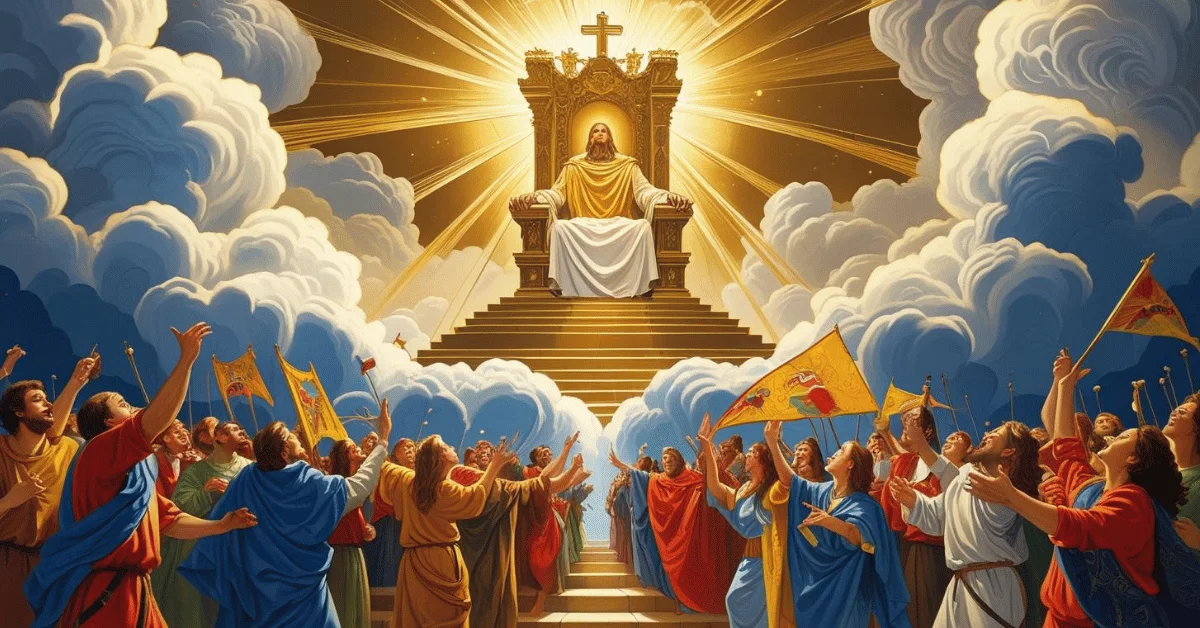Psalm 68 stands out as one of the most triumphant and complex hymns in the Book of Psalms. Unlike simple prayers or laments, this psalm bursts with imagery of God as a mighty warrior, a deliverer of the oppressed, and a king enthroned in glory.
The Historical Background of Psalm 68
Psalm 68 does not explicitly name its occasion, but biblical scholars connect it with pivotal events in Israel’s history.
The Ark’s Journey to Jerusalem
Many link Psalm 68 to the time when King David brought the Ark of the Covenant into Jerusalem (2 Samuel 6). The psalm’s imagery of God “ascending on high” mirrors the Ark being carried up Mount Zion, symbolizing God’s enthronement among His people.
Echoes of the Wilderness Experience
The opening verse, “Let God arise, let His enemies be scattered,” recalls Israel’s wilderness journey in Numbers 10:35. Each time the Ark set out, this cry reminded Israel that God marched ahead of them, ensuring victory over their enemies. Psalm 68 echoes that same assurance of God’s presence and power.
Psalm 68 as a Song of Victory
At its core, Psalm 68 celebrates God as a victorious warrior who defeats enemies and rescues His people.
God’s Triumph Over Nations
The psalm describes enemies being scattered and mountains trembling at His presence. These powerful images reflect Israel’s belief that no nation could withstand Yahweh, the God of heaven and earth.
God’s Care for the Weak
Interestingly, this victory hymn also emphasizes God’s compassion. Verses highlight His concern for the fatherless, widows, and the poor — showing that His strength is not only for conquest but also for justice and care.
A Liturgical Hymn for Worship

Psalm 68 was likely sung during processions or festivals, making it both a theological statement and a worship anthem.
A Processional Song of Triumph
Its structure suggests a liturgical setting, possibly sung by choirs and worshippers as the Ark was carried into the holy city. The vivid calls to praise and celebration point to a festival atmosphere filled with music, dance, and proclamation.
Theological Significance in Worship
By using Psalm 68 in communal worship, Israel affirmed their faith in God’s sovereignty. It reminded them that their national victories were not due to military power alone, but because of God’s divine intervention and kingship.
Related Posts
- I Was Jobless and Hopeless—Until I Prayed Psalm 112
- How Does Psalm 90 Help Us Think About the Exile?
- Psalm 1 KJV: The Blessed Man vs. The Wicked
- Psalm 75 Commentary: Justice, Judgment, and Hope
The Universal Message of Psalm 68
Although Psalm 68 is rooted in Israel’s history, its vision stretches far beyond one nation to highlight God’s global reign.
Key Takeaways from Its Universal Vision
- God’s rule is global — not limited to Israel but extending over every nation.
- Kings bring tribute — rulers are pictured as honoring Yahweh’s authority.
- A declaration of supremacy — Israel’s God is shown as higher than all other deities.
- The psalm points forward — anticipating a time when the whole world acknowledges God.
- Foreshadows Christ’s ascension — the New Testament (Ephesians 4:8) connects Psalm 68:18 to Jesus’ victory and exaltation.
- A kingdom without borders — God’s authority is not tied to geography, politics, or culture.
- A message of hope — assurance that injustice and oppression will not last, because God reigns over all.
Why Psalm 68 Still Matters Today

Even though Psalm 68 was written thousands of years ago, its themes remain powerful and relevant.
Encouragement for the Faithful
Believers today can draw comfort from its reminder that God rises to defend His people, cares for the vulnerable, and reigns above all opposition.
A Call to Worship
Just as Israel used this psalm to celebrate God’s presence, modern readers can use it as a call to worship — lifting their voices in gratitude and awe for God’s mighty works.
Conclusion: The Purpose of Psalm 68
Psalm 68 was written as a grand hymn of victory, celebrating God’s past deliverance, His present reign, and His ultimate universal authority. Rooted in Israel’s worship life, it commemorated events like the Ark’s arrival in Jerusalem and echoed the wilderness journey.
👉 For deeper study on the Psalms and their historical background, resources like Bible Gateway provide accessible translations and commentaries that enrich understanding.
Frequently Asked Questions
What is the main theme of Psalm 68?
Psalm 68 celebrates God as a victorious warrior, protector of the vulnerable, and King over all nations. It emphasizes His power, justice, and universal reign.
Who wrote Psalm 68?
Psalm 68 is attributed to King David. Many scholars believe it was composed during the time he brought the Ark of the Covenant to Jerusalem.
Why does Psalm 68 mention God’s enemies being scattered?
This imagery reflects God’s role as a divine warrior who defeats His people’s enemies. It reassures Israel that God’s presence guarantees victory and protection.
Why is Psalm 68 considered difficult to interpret?
It contains vivid imagery, ancient military and cultural references, and poetic shifts in style. These make it one of the most complex psalms to study.


Everyone loves what you guys tend to be up too. Such clever work and reporting!
Keep up the great works guys I’ve you guys to blogroll.
THANK YOU